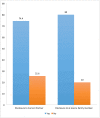Demographic, clinical and behavioural determinants of HIV serostatus non-disclosure to sex partners among HIV-infected pregnant women in the Eastern Cape, South Africa
- PMID: 28837563
- PMCID: PMC5570311
- DOI: 10.1371/journal.pone.0181730
Demographic, clinical and behavioural determinants of HIV serostatus non-disclosure to sex partners among HIV-infected pregnant women in the Eastern Cape, South Africa
Abstract
Objectives: Drawing from a baseline sample of a cohort study, the study examines the extent and correlates of serostatus non-disclosure to sex partners and family members, and reasons for non-disclosure among HIV-infected pregnant women in the Eastern Cape Province, South Africa.
Methods: This longitudinal cohort study recruited 1709 pregnant women living with HIV who attended three of the largest maternity centres in the Eastern Cape, South Africa, for delivery between September 2015 and May 2016. Relevant items on demographics, serostatus awareness, disclosure to sex partners and family members, and lifestyle behaviours were obtained using structured interviews. Age-stratified binary logistic regression models were used to determine the significant correlates of non-disclosure among the participants.
Results: A higher rate of HIV serostatus non-disclosure to sex partners (25.6%) in comparison to family members (20%) was reported by the participants. Younger age, not living with partners and alcohol use were significantly associated with non-disclosure of HIV serostatus to sex partners. Non-disclosure of HIV serostatus to sex partners was significantly (p<0.05) associated with poor adherence to the highly active anti-retroviral therapy (HAART), failure to keep clinic appointments and high viral load at the delivery of the baby. Perceived fear of intimate partner violence, fear of rejection, guilt of not disclosing at the onset of the relationship, sex partner's non-disclosure of HIV serostatus, and guilt of unfaithfulness were some of the reasons for non-disclosure of HIV serostatus to sex partners.
Conclusions: Non-disclosure of HIV serostatus is a public health concern with serious implications for both mother-to-child transmission, as well as horizontal transmission, in our setting. Strategic efforts toward ending the epidemic of HIV and AIDS in South Africa should address the sociocultural and behavioural determinants of non-disclosure.
Conflict of interest statement
Figures
References
-
- Zuma K, Shisana O, Rehle TM, Simbayi LC, Jooste S, Zungu N, et al. New insights into HIV epidemic in South Africa: key findings from the National HIV Prevalence, Incidence and Behaviour Survey, 2012. African Journal of AIDS Research. 2016;15(1):67–75. doi: 10.2989/16085906.2016.1153491 - DOI - PubMed
-
- Brou H, Djohan G, Becquet R, Allou G, Ekouevi DK, Viho I, et al. When do HIV-infected women disclose their HIV status to their male partner and why? A study in a PMTCT programme, Abidjan. PLoS Med. 2007;4(12):e342 doi: 10.1371/journal.pmed.0040342 - DOI - PMC - PubMed
-
- Conserve DF, King G, Dévieux JG, Jean-Gilles M, Malow R. Determinants of HIV serostatus disclosure to sexual partner among HIV-positive alcohol users in Haiti. AIDS and Behavior. 2014;18(6):1037–45. doi: 10.1007/s10461-013-0685-8 - DOI - PMC - PubMed
MeSH terms
LinkOut - more resources
Full Text Sources
Other Literature Sources
Medical


